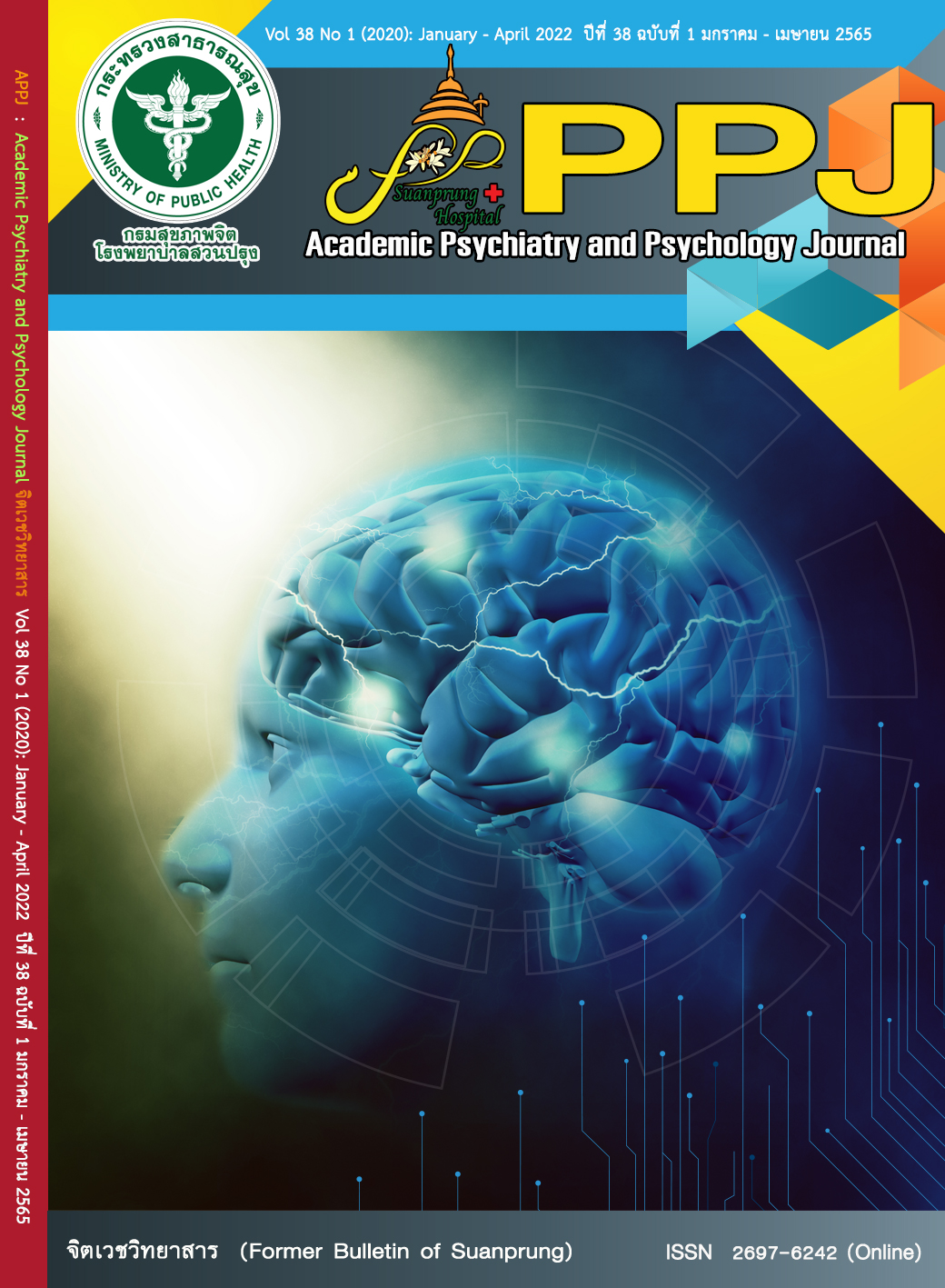Reliability and Validity of Advance Warning of Relapse Questionnaire : Thai Version
Main Article Content
Abstract
Objective: The purpose of this study was to test the internal consistency and content validity of the Advance Warning of Relapse Questionnaire: Thai Version
Materials and Methods: Forward-backward translation techniques were used to study the reliability and validity of Advance Warning of Relapse Questionnaire: Thai Version. The sample were patients with alcohol dependence who received services at the outpatient department, Suanprung Psychiatric Hospital between June to July 2020. Data was collected using self-report and analyzed by descriptive statistics, Pearson’s product-moment correlation coefficients, and Cronbach’s alpha coefficient.
Results: The content validity of Advance Warning of Relapse Questionnaire: Thai Version was 0.87, Corrected Item-Total Correlation was more than 0.30, and Cronbach’s alpha coefficient for all scale was 0.92.
Conclusion: The Advance Warning of Relapse Questionnaire: Thai Version has validity and reliability for assessing the warning of relapse signs of patients with alcohol dependence. This instrument can be applied for monitoring patients with alcohol dependence after hospital discharge.
Article Details

This work is licensed under a Creative Commons Attribution-NonCommercial-NoDerivatives 4.0 International License.
บทความหลังผ่านการปรับแก้จากกองบรรณาธิการแล้ว เป็นลิขสิทธ์ของวารสารจิตเวชวิทยาสาร โรงพยาบาลสวนปรุง กรมสุขภาพจิต กระทรวงสาธารณสุข ห้ามเผยแพร่เพื่อประโยชน์ทางการค้าโดยไม่ได้รับอนุญาต แต่อนุญาตให้เผยแพร่บทความดังกล่าวเพื่อประโยชน์ทางการศึกษาแก่ประชาชนทั่วไป ทั้งนี้กองบรรณาธิการไม่จำเป็นต้องเห็นด้วยกับบทความหรือข้อคิดเห็นใดๆ ที่ปรากฏในวารสารสวนปรุง
References
McKay JR, Hiller-Sturmhöfel S. Treating alcoholism as a chronic disease: approaches to long-term continuing care. Alcohol Res Health. 2011;33(4):356-70. PMID: 23580020.
Lenaerts E, Mathei C, Matthys F, Zeeuws D, Pas L. Continuity care for patients with alcohol use disorders: A systematic review. Drug Alcohol Depend. 2014 Feb 1;135:9-21. PMID: 24314854.
Van den Berg FJ, Van den Brink W, Kist N, Hermes JSJ, Kok RM. Social factors and readmission after inpatient detoxification in older alcohol-dependent patients. Am J Addict 2015;24:661-6.
Evren C, Durkaya M, Dalbudak E, Celik S, Cetin R, Cakmak D. Factors related with relapse in male alcohol dependents: 12 months follow-up study. Dusunen Adam 2010;23:92-9. doi: 10.5350/DAJPN2010230203t.
Schellekens AF, de Jong CA, Buitelaar JK, Verkes RJ. Co-morbid anxiety disorders predict early relapse after inpatient alcohol treatment. Eur Psychiatry. 2015 Jan;30(1):128-36. PMID: 24630346.
Nagaich N, Sharma R, Garg N, Nijhawan S, Subhash N. Factors affecting remission and relapse in alcohol dependence can they really predict?. J Liver Res Disord Ther 2016;2(3):78-81. doi: 10.15406/jlrdt.2016.02.00028.
Schwarzinger M, Thiébaut SP, Baillot S, Mallet V, Rehm J. Alcohol use disorders and associated chronic disease-a national retrospective cohort study from France. BMC Public Health 2017 Jul 21;18(1):43. doi: 10.1186/s12889-017-4587-y.
Holst C, Tolstrup JS, Sørensen HJ, Becker U. Alcohol dependence and risk of somatic diseases and mortality: a cohort study in 19 002 men and women attending alcohol treatment. Addiction. 2017 Aug;112(8):1358-66. doi: 10.1111/add.13799.
Laramée P, Leonard S, Buchanan-Hughes A, Warnakula S, Daeppen JB, Rehm J. Risk of all-cause mortality in alcohol-dependent individuals: a systematic literature review and meta-analysis. EBioMedicine. 2015 Sep 2;2(10):1394-404.
doi: 10.1016/j.ebiom.2015.08.040.
Duka T, Stephens DN. Repeated detoxification of alcohol-dependent patients impairs brain mechanisms of behavioural control important in resisting relapse. Curr Addict Rep 2014;1:1–9. doi: 10.1007/s40429-013-0009-0.
Kuria MW, Ndetei DM, Obot IS, Khasakhala LI, Bagaka BM, Mbugua MN, Kamau J. The association between alcohol dependence and depression before and after treatment for alcohol dependence. ISRN Psychiatry. 2012 Jan 26;2012:482802. doi: 10.5402/2012/482802. PMID: 23738204.
Lai HM, Cleary M, Sitharthan T, Hunt GE. Prevalence of comorbid substance use, anxiety and mood disorders in epidemiological surveys, 1990-2014: a systematic review and meta-analysis. Drug Alcohol Depend. 2015 Sep 1;154:1-13.
doi: 10.1016/j.drugalcdep.2015.05.031. PMID: 26072219.
Yoshimi NT, Campos LM, Simão MO, Torresan RC, Torres AR. Social anxiety symptoms in alcohol-dependent outpatients: prevalence, severity and predictors. Bras Psiquiatr 2016;65(2):117-26. doi: 10.1590/0047-2085000000112.
Myers MG, Martin RA, Rohsenow DJ, Monti PM. The relapse situation appraisal questionnaire: Initial psychometric characteristics and validation. Psychol Addict Behav 1996;10(4):237-47. doi: 10.1037/0893-164X.10.4.237.
Ogai Y, Yamashita M, Endo K, Haraguchi A, Ishibashi Y, Kurokawa T, et al. Application of the relapse risk scale to alcohol-dependent individuals in Japan: comparison with stimulant abusers. Drug Alcohol Depend. 2009 Apr 1;101(1-2):20-6.
doi: 10.1016/j.drugalcdep.2008.10.021. PMID: 19084356.
Adinoff B, Talmadge C, Williams MJ, Schreffler E, Jackley PK, Krebaum SR. Time to Relapse Questionnaire (TRQ): a measure of sudden relapse in substance dependence. Am J Drug Alcohol Abuse. 2010 May;36(3):140-9. doi: 10.3109/00952991003736363. PMID: 20465371.
Miller WR, Harris RJ. A simple scale of Gorski's warning signs for relapse. J Stud Alcohol. 2000 Sep;61(5):759-65.
doi: 10.15288/jsa.2000.61.759. PMID: 11022817.
Arun AC, Ilangovan N, Rajma J. Risk factors for alcohol use relapse after abstinence in patients with alcoholic liver disease. J Family Med Prim Care. 2020 Dec 31;9(12):5995-9. doi: 10.4103/jfmpc.jfmpc_1401_20. PMID: 33681032.
Maisto SA, Hallgren KA, Roos CR, Swan JE, Witkiewitz K. Patterns of transitions between relapse to and remission from heavy drinking over the first year after outpatient alcohol treatment and their relation to long-term outcomes. J Consult Clin Psychol. 2020 Dec;88(12):1119-32. doi: 10.1037/ccp0000615. PMID: 33370135.
Sawasdipanich N, Tiansawad S. (2011). Instrument translation for cross-cultural research: technique and issues to be considered. JTNMC 2011;26(1):19-28. (in Thai)
Polit DF, Hungler BP. Nursing research: principles and methods. Philadelphia: Lippincott; 1999.
Chuntum K. Health-related quality of life measurement scale: guide to development. J Med Health Sci 2017;24(3):11-21. (in Thai)
Ferketich S. Focus on psychometrics. Aspects of item analysis. Res Nurs Health. 1991 Apr;14(2):165-8. doi: 10.1002/nur.4770140211. PMID: 2047538.
Strener DL, Norman GR. Health measurement scales: a practical guide to their development and use. Oxford: Oxford University Press; 2008.
DeVellis RF. Scale development: theory and applications. Newbury Park, CA: SAGE; 1991.
Farnia V, Abdoli N, Radmehr F, Alikhani M, Moradinazar M, Rezaei M, et al. Validation of the Persian version of the AWAER questionnaire (preventive warning of relapse - revised form) in methamphetamine users. J Subst Use 2021;26(3):333-9. doi: 10.1080/14659891.2020.1838633.

